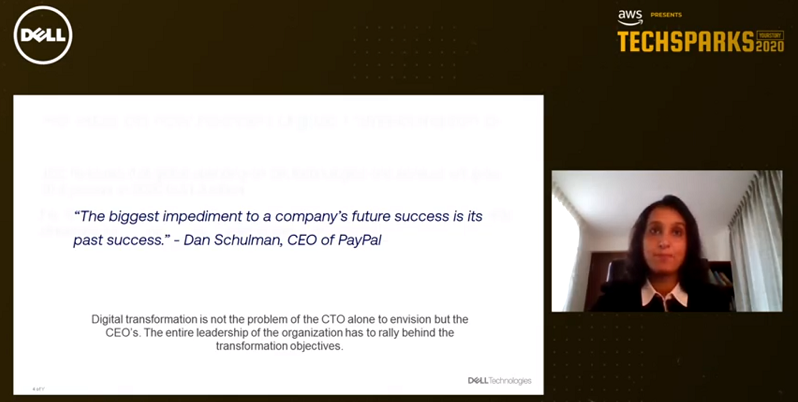Digital adoption grew bigger among companies during the ongoing COVID-19 pandemic, as a lot of them changed the way they worked before.
At YourStory’s flagship event TechSparks 2020, Suchitra Kolluru, Head - Education, Healthcare, and Startups, Dell Technologies, spoke extensively on the need for digital transformation in the new normal.
“One of the hardest questions in digital transformation is how do we get over the initial humps from the vision stage to execution. This sometimes could mean walking away from long-standing business processes that have probably in the past defined the growth and the success of companies, and the very reason that companies were built upon in favour of relatively new practices that are still being defined. Therefore, in a lot of cases, it means a complete change in the status quo,” Suchitra said.
She advised that when leaders take on the mantle of digital transformation for their organisations, they need to be fully aware of this reality as they frame their conversations around the same.

A screengrab during the session at TechSparks 2020
“Digital transformation should begin primarily with a problem statement. The quantum and the outcome of digital transformation would really depend on how clearly the problem statement is defined, how it translates into an opportunity, and an aspirational goal,” she said.
She further added that the entire leadership of the organisation must rally behind transformation objectives if it needs to see this becoming a success.
Digital Transformation Index
A report by IDC forecasts that the global spending on digital technologies and transformations — whether it be on the product, pure technology platforms, or services — will grow 10.4 percent in 2020, thereby taking the spends to $1.3 trillion.
Dell had conducted a Digital Transformation Index in 2016 and 2018 to see and compare how and at what stage various customers and industries are in for adoption of digital transformation as part of their core business processes. Under this, customers have been defined into five buckets.
“Spearheading digital transformation is about five percent, who classify themselves as leaders. This is followed by adopters (23 percent), who are primarily mature and have digital plans, investments, and innovation in place at an organisation level,” she added.
Subsequently, there are the evaluators (33 percent), who are primarily gradual in their adoption of transformation and planning towards seriously taking on digital transformation in organisations.
The fourth category is of the followers (30 percent), who invest with some inhibition, probably limited to one or two initiatives. The final category is of the laggards (nine percent), who don't have a digital plan.
Suchitra said, “What we have seen is that the curve is positively moving towards more followers and evaluators, tending to be leaders and adopters. While those that have probably cloud-native organisations, have completely disrupted a particular industry in the way they've taken on digital transformation, and therefore, are categorised as leaders, and continue to be the top five percent.”
In the backdrop of the Dell Digital Transformation Index survey, she also spoke about customer transformation strategies, and how they vary depending on the stage and the level of adoption across various customers.
“Sometimes for survival and sometimes for productivity at different stages, organisations will have to evaluate their strategy around digital transformation and pick up what suits them and their industry the best,” she said.
Challenges in the digital transformation
Digital transformation is not without the necessary challenges. According to Suchitra, these challenges are huge, and the important decisions taken for digital transformation has to be adopted seriously.
The first one is the reluctance to adapt. “When a transformation is underway, right from the top brass to the front line sales, people should be open to change because it will lead to changes in their day-to-day practices. Upskilling resources to take on those workloads would need human intervention necessary in the future stage once technology adoption is adequate,” she said.

Suchitra Kolluru during TechSparks 2020
The second challenge for organisations is inaccurate and unreliable data silos. Suchitra said it is important to foster a culture of the continuous learning process as to how data needs to be captured, saved, and what tools have to be used to ensure that these data silos talk to each other for generating the right insights.
The third and important challenge is the inferior knowledge and skills, which is typically an impediment when data needs to move to the next level of insights.
“Therefore, there has to be the right kind of skilling and training programmes to ensure that data captured is understood and consumed in a manner that we can actually bring out relatable and insightful outcomes from wedding various data sets together,” she added.
While all of this is put at the foundational level, there seems to be a lack of direction and strategy in organisations. For this, Suchitra suggested that digital transformation has to be modular. This means, while it has to be all encompassing and should be impacted at the cultural level, it can best be measured and tracked when it is broken up into understandable modules within various functions.
Finally, in the list of challenges, comes system incompatibility, which is leading to increased use of time and money.
“It's extremely important that we drive the right stakeholder collaboration to determine infrastructure budgets that need to be taken up either in the near term or in the long term to ensure that there is necessary technology upgradation would mean in both aspects — the hardware technology and software technology,” she explained.
Suchitra concluded by saying there is also a huge looming risk of cyber threats that are seeing a rise in certain industries more than others, and that the leaders and policymakers need to enable more efficient and responsive integration of technology.
TechSparks - YourStory's annual flagship event - has been India's largest and most important technology, innovation, and entrepreneurship summit for over a decade, bringing together entrepreneurs, policymakers, technologists, investors, mentors, and business leaders for stories, conversations, collaborations, and connections that matter. As TechSparks 2020 goes all virtual and global in its 11th edition, we want to thank you for the tremendous support we've received from all of you throughout our journey and give a huge shoutout to our sponsors of TechSparks 2020.
Edited by Suman Singh
Link : https://yourstory.com/2020/11/techsparks-2020-dell-technologies-suchitra-kollur
Author :- Apurva P ( )
November 19, 2020 at 04:10PM
YourStory



